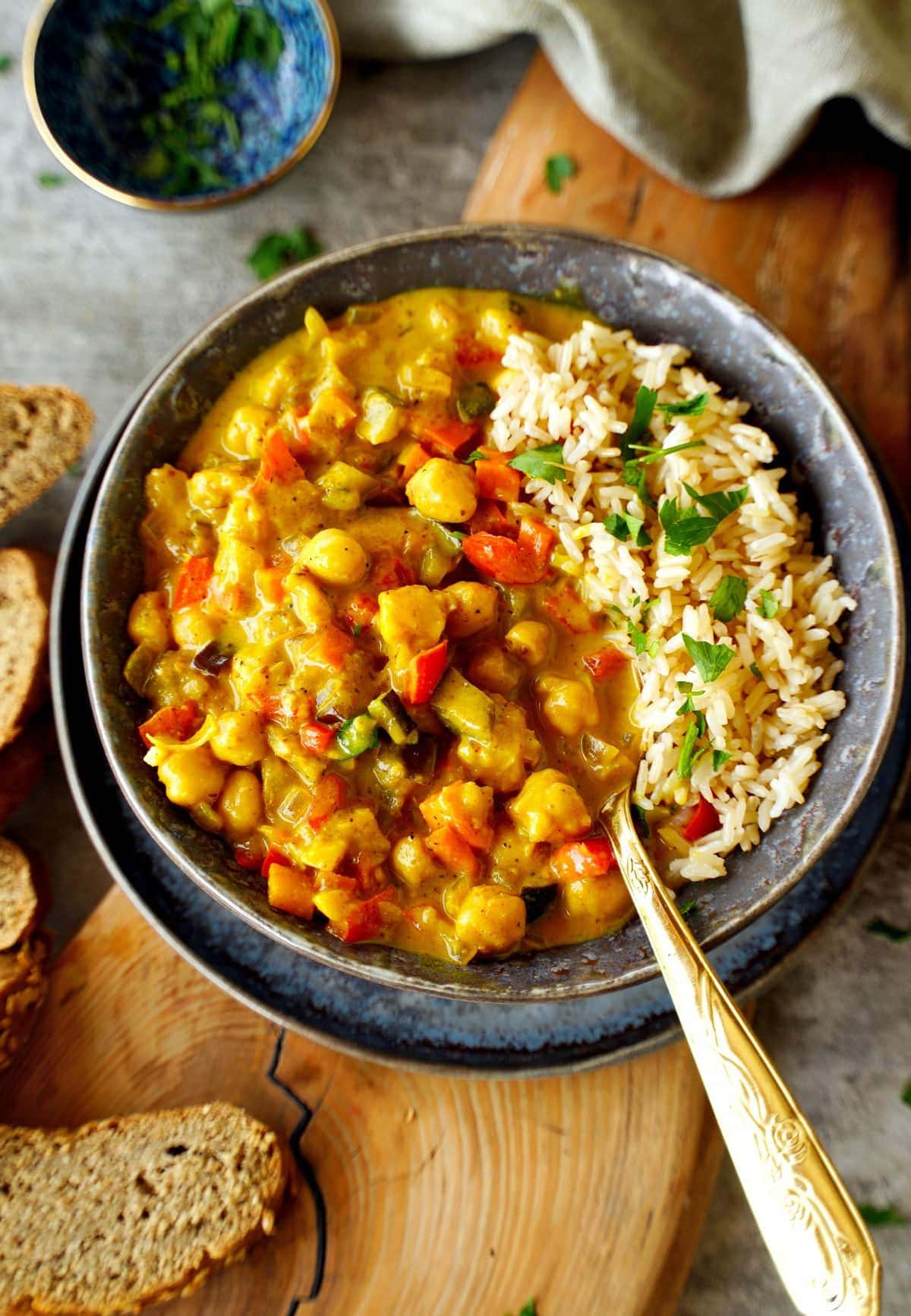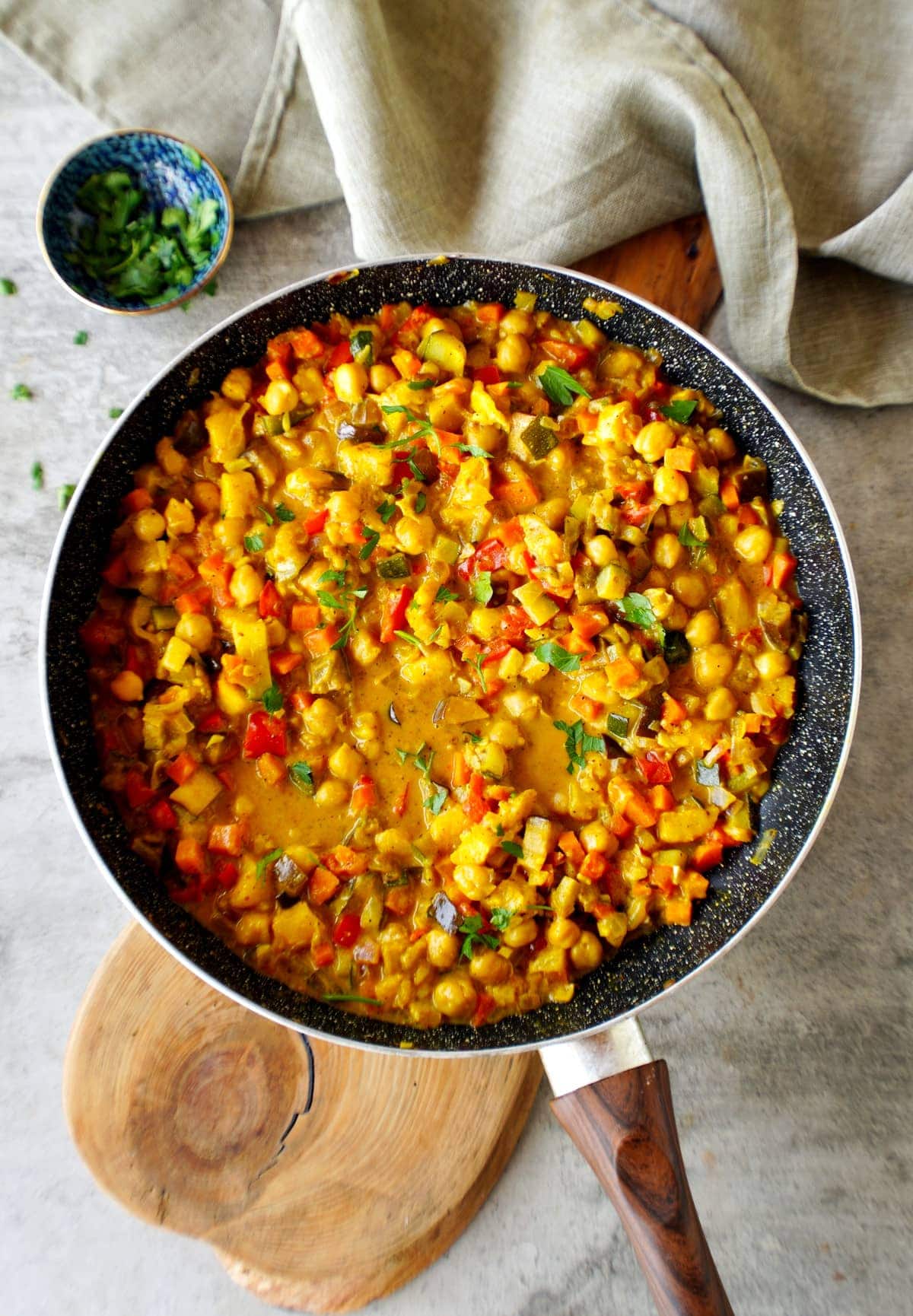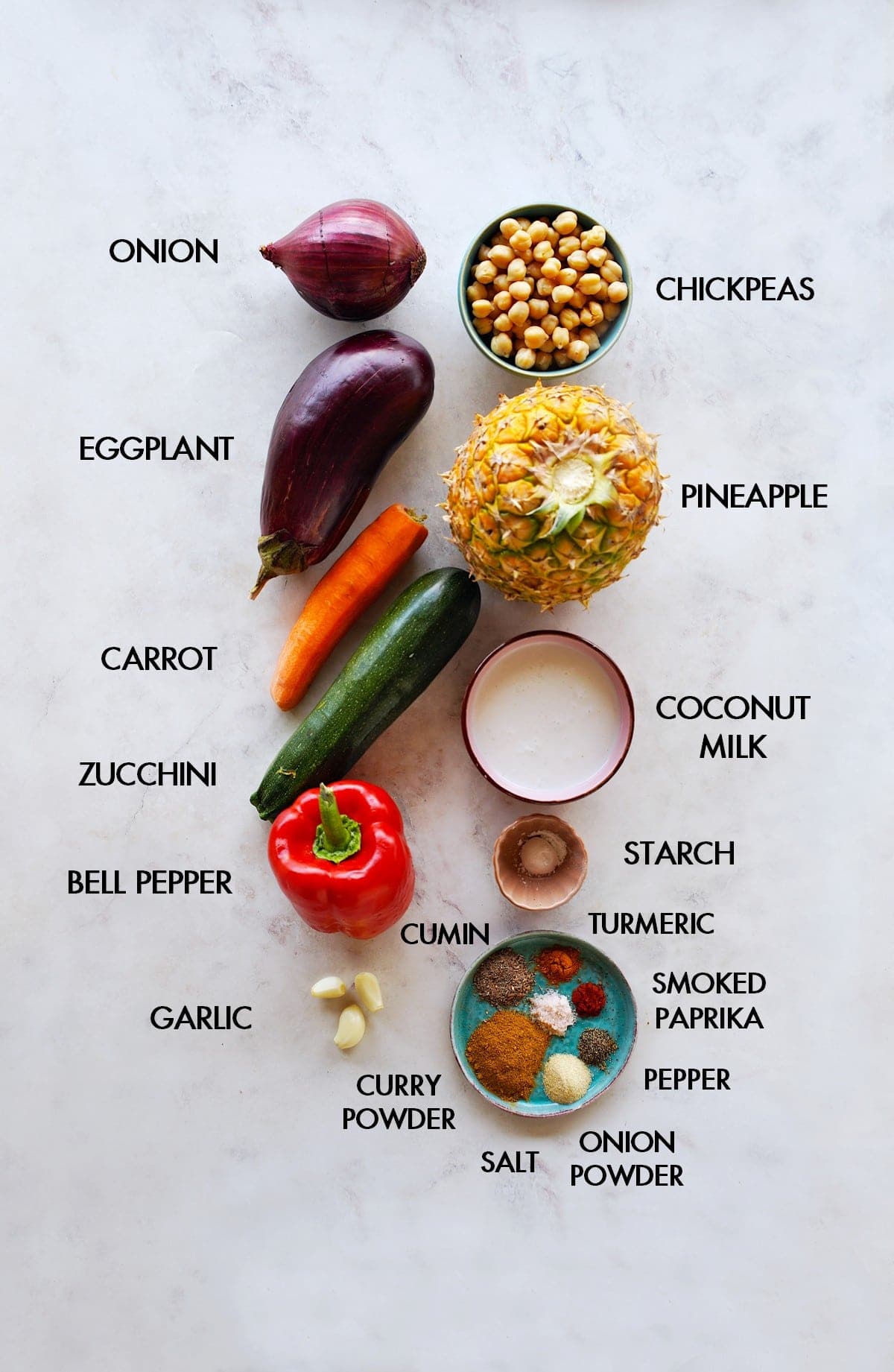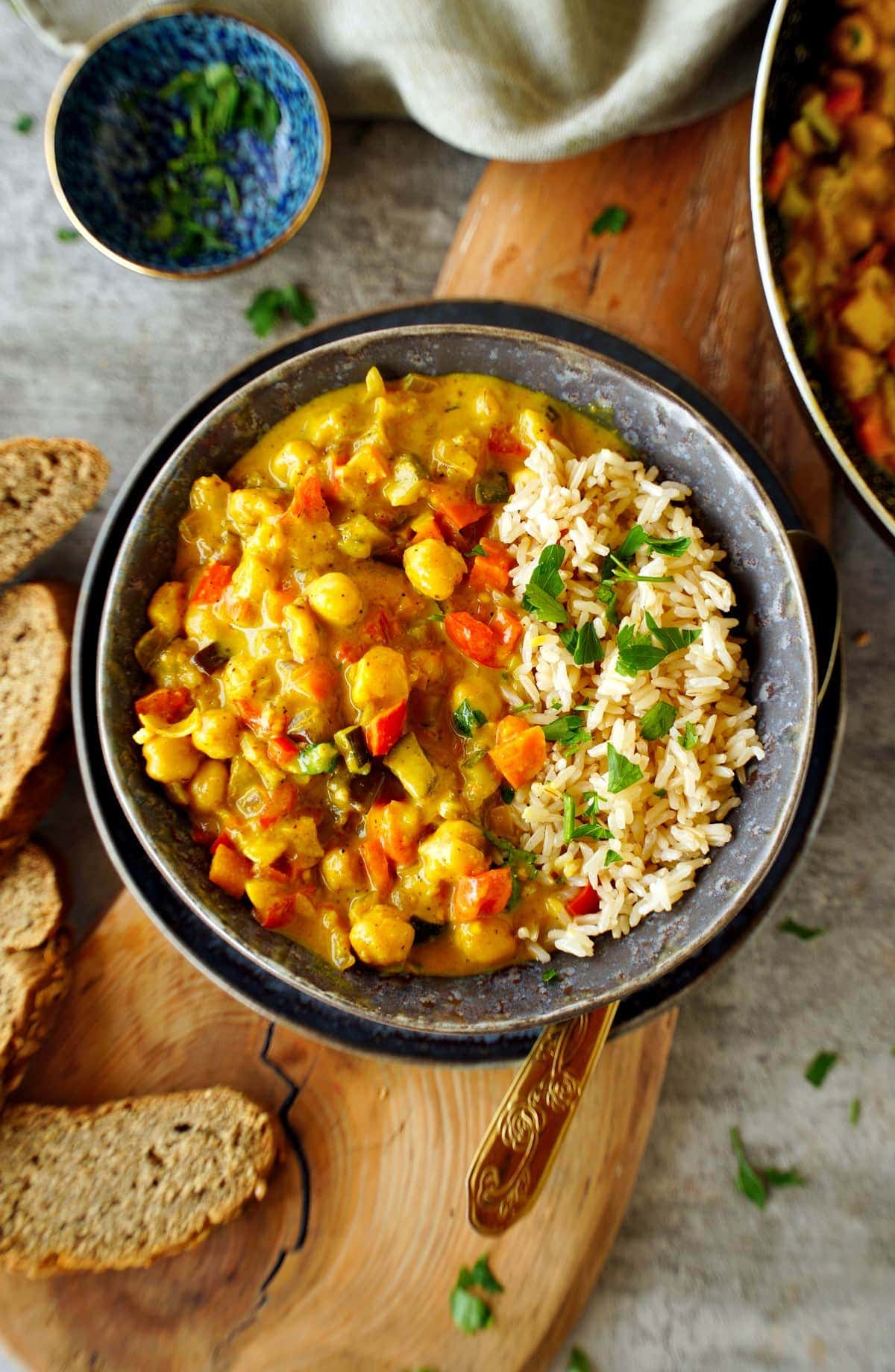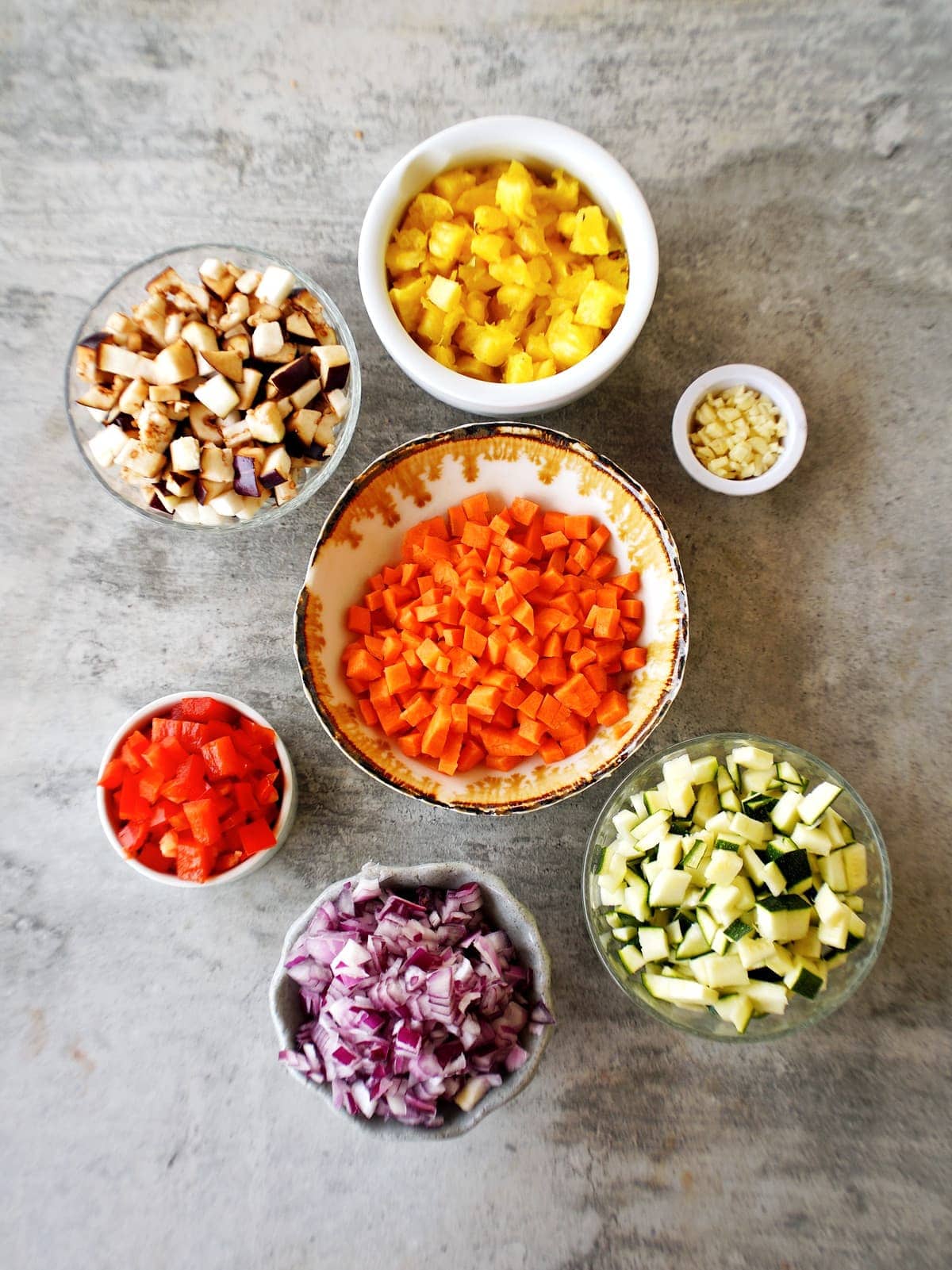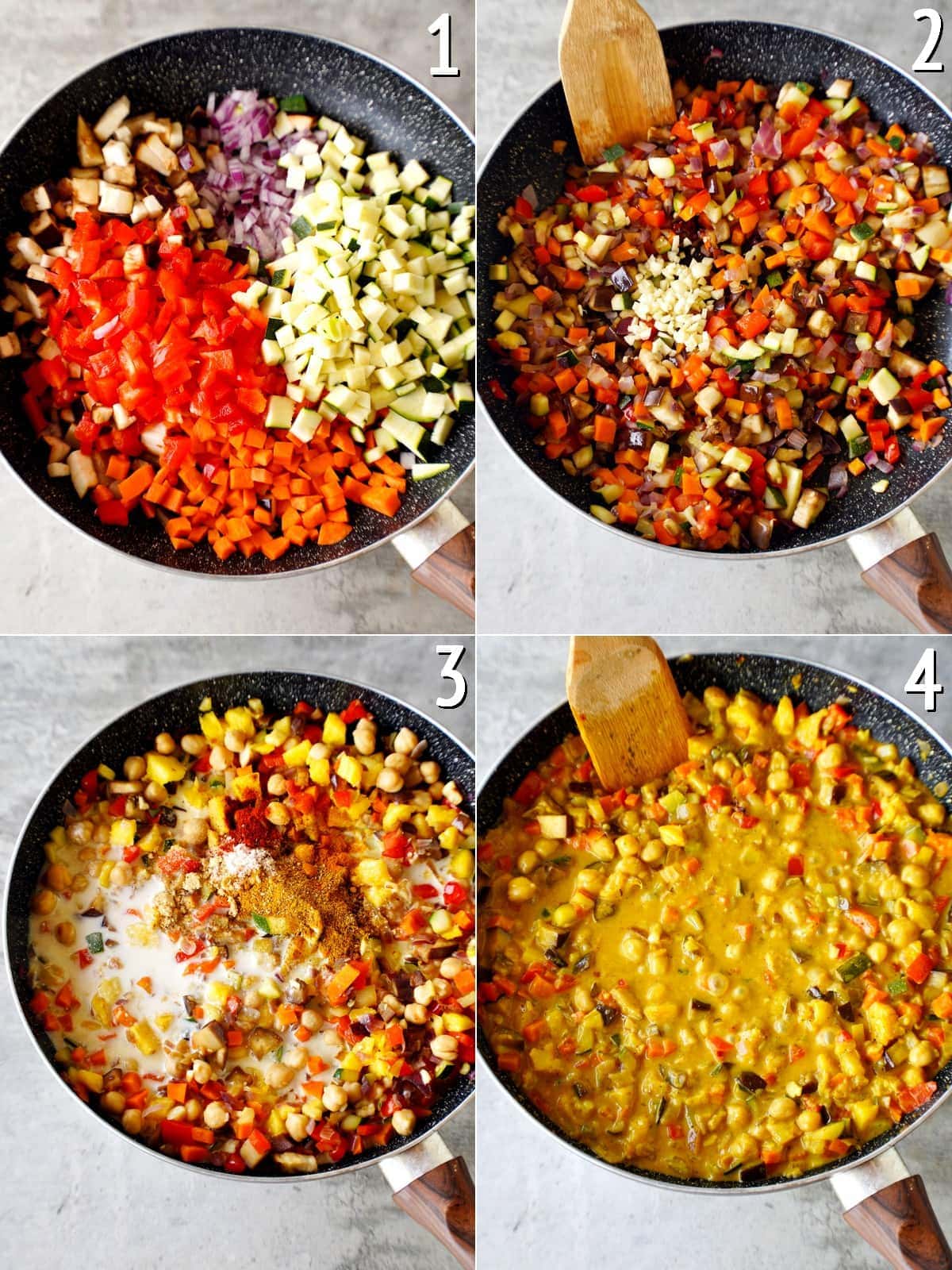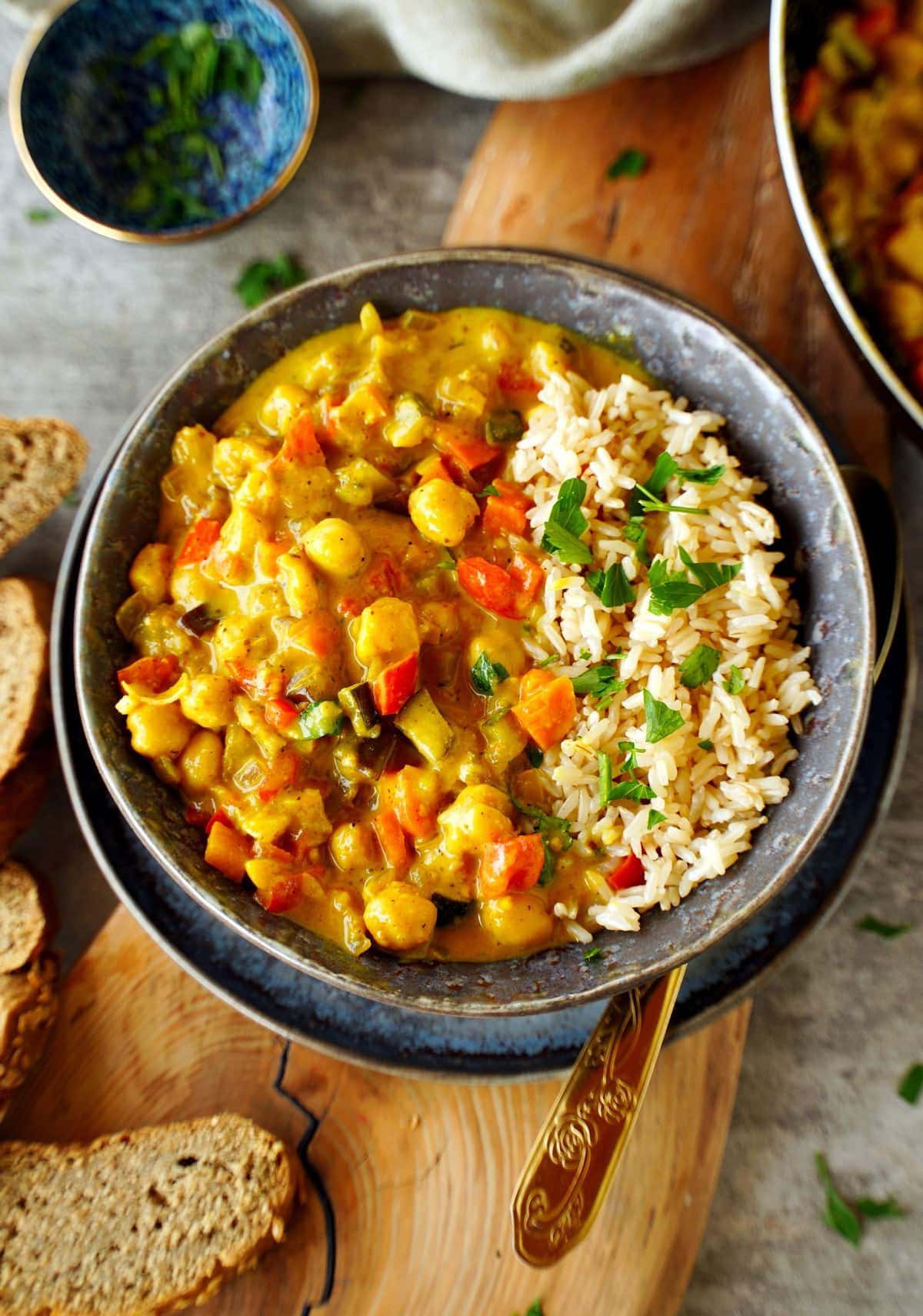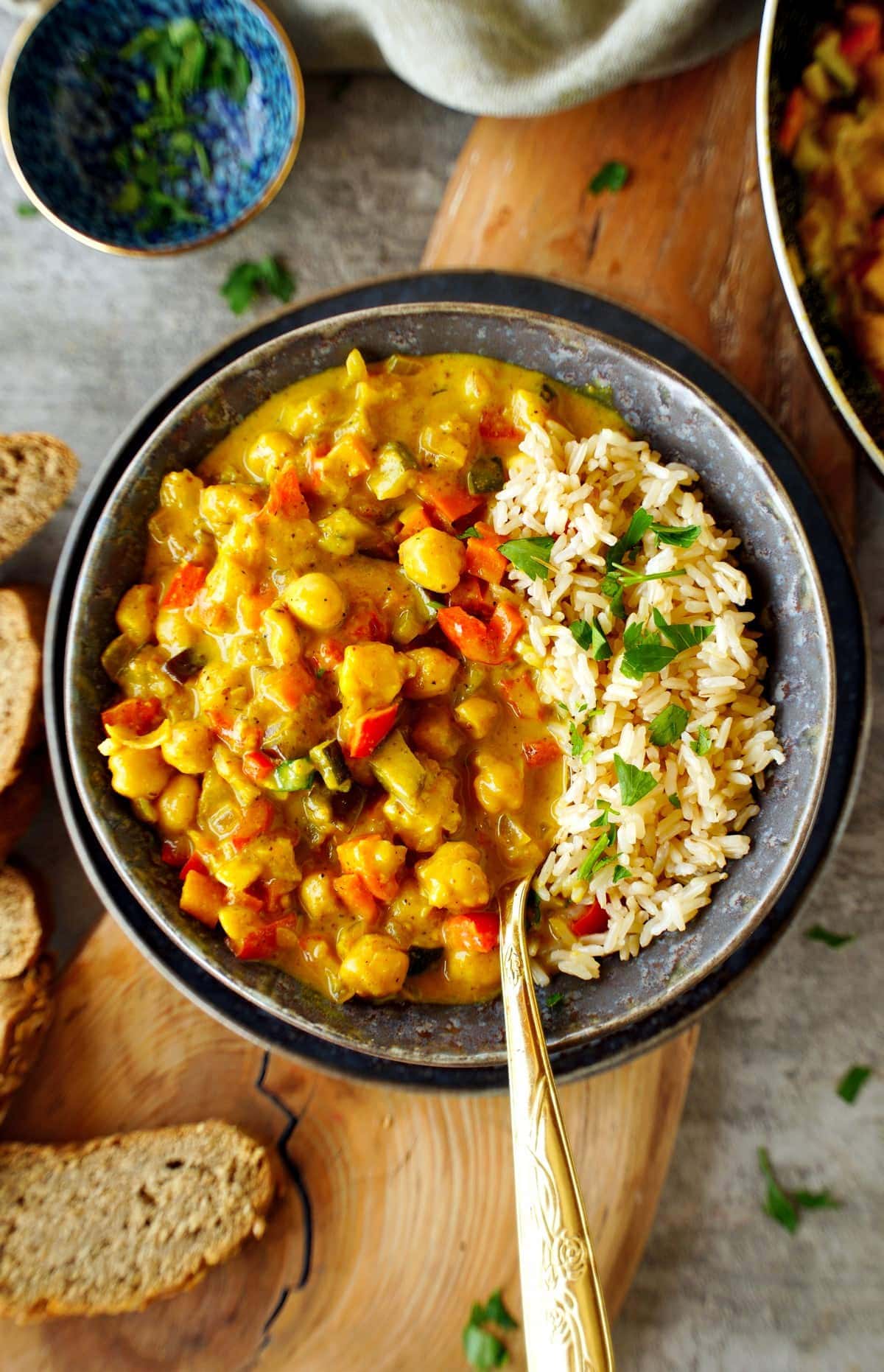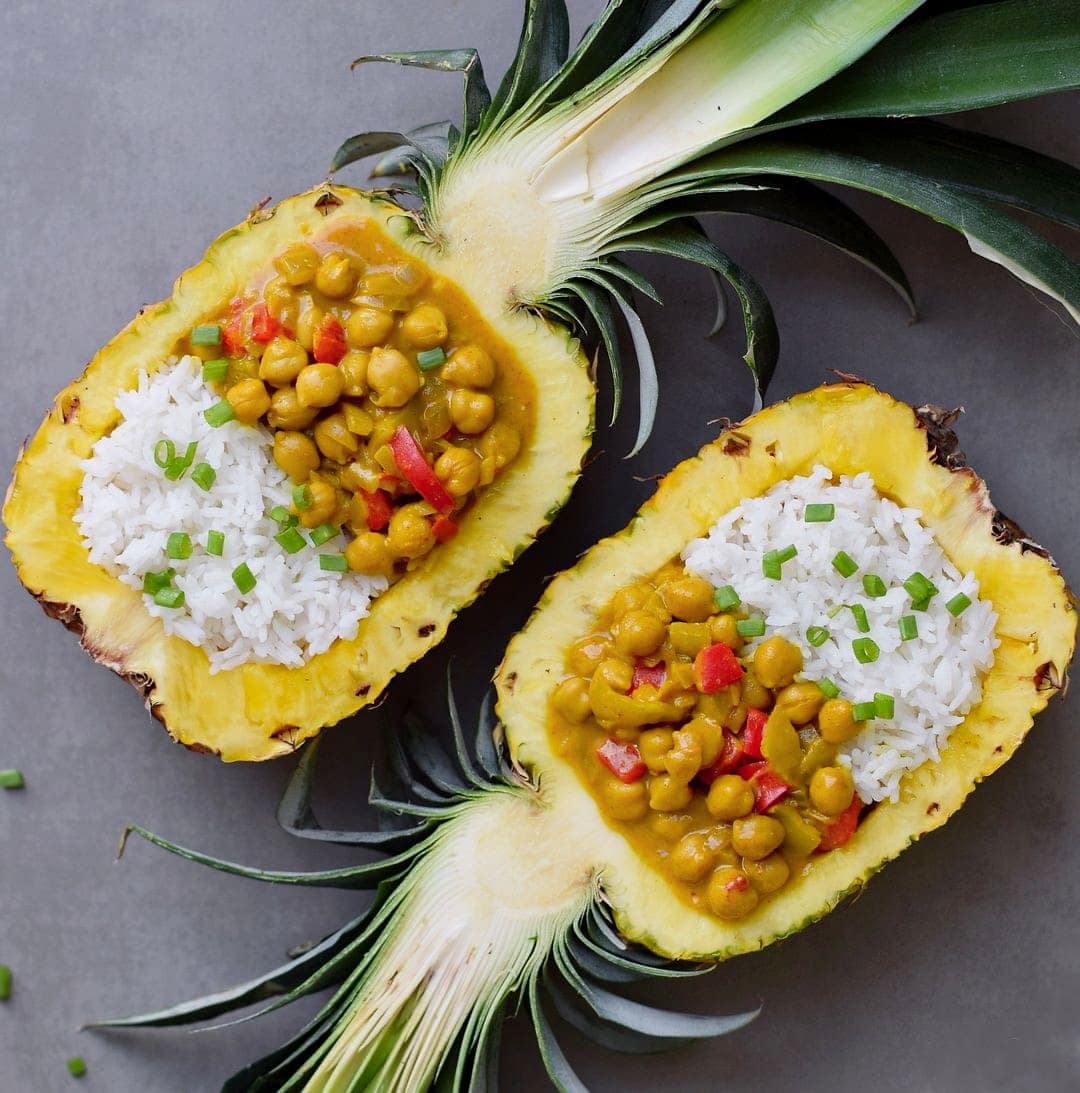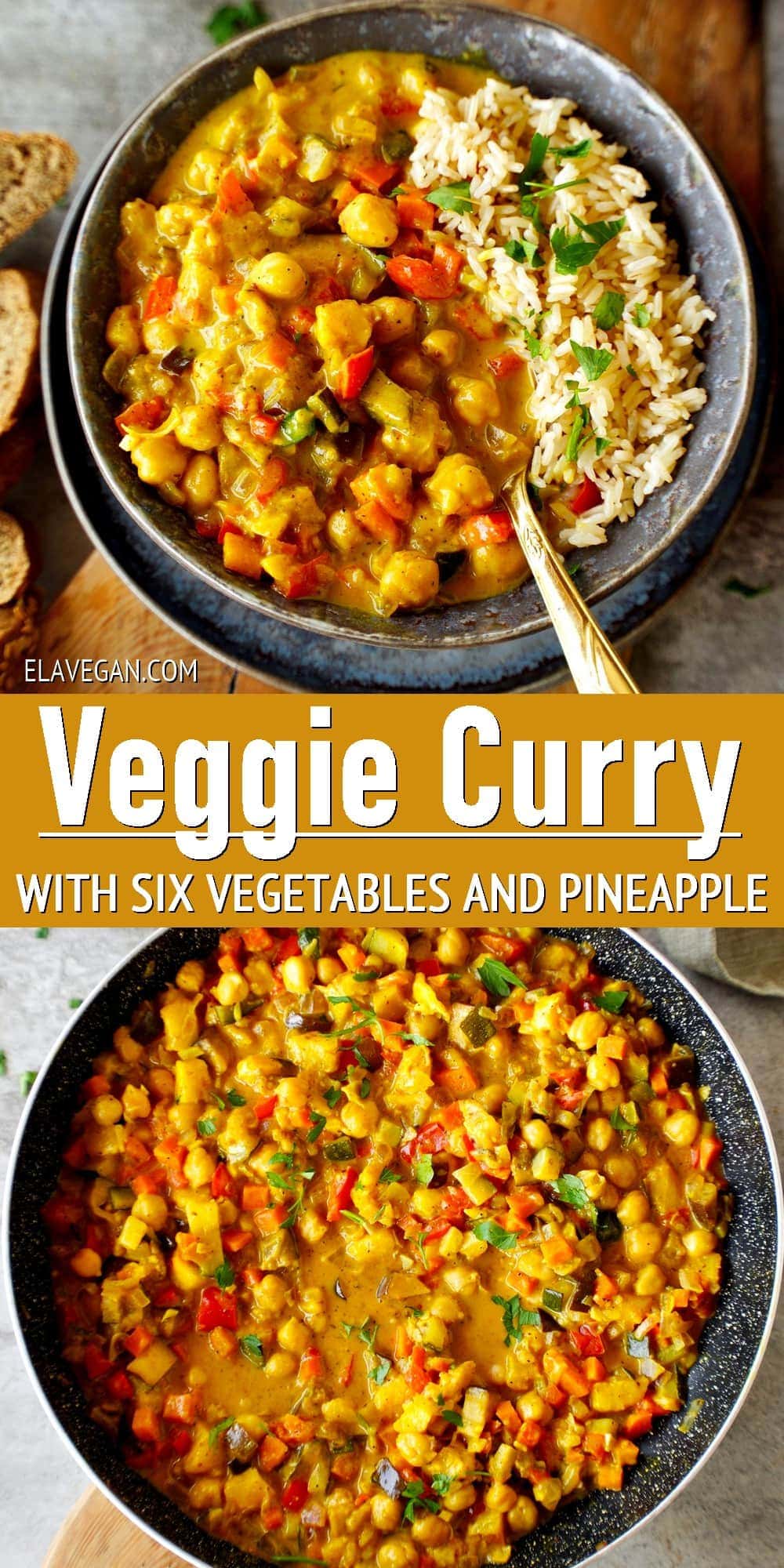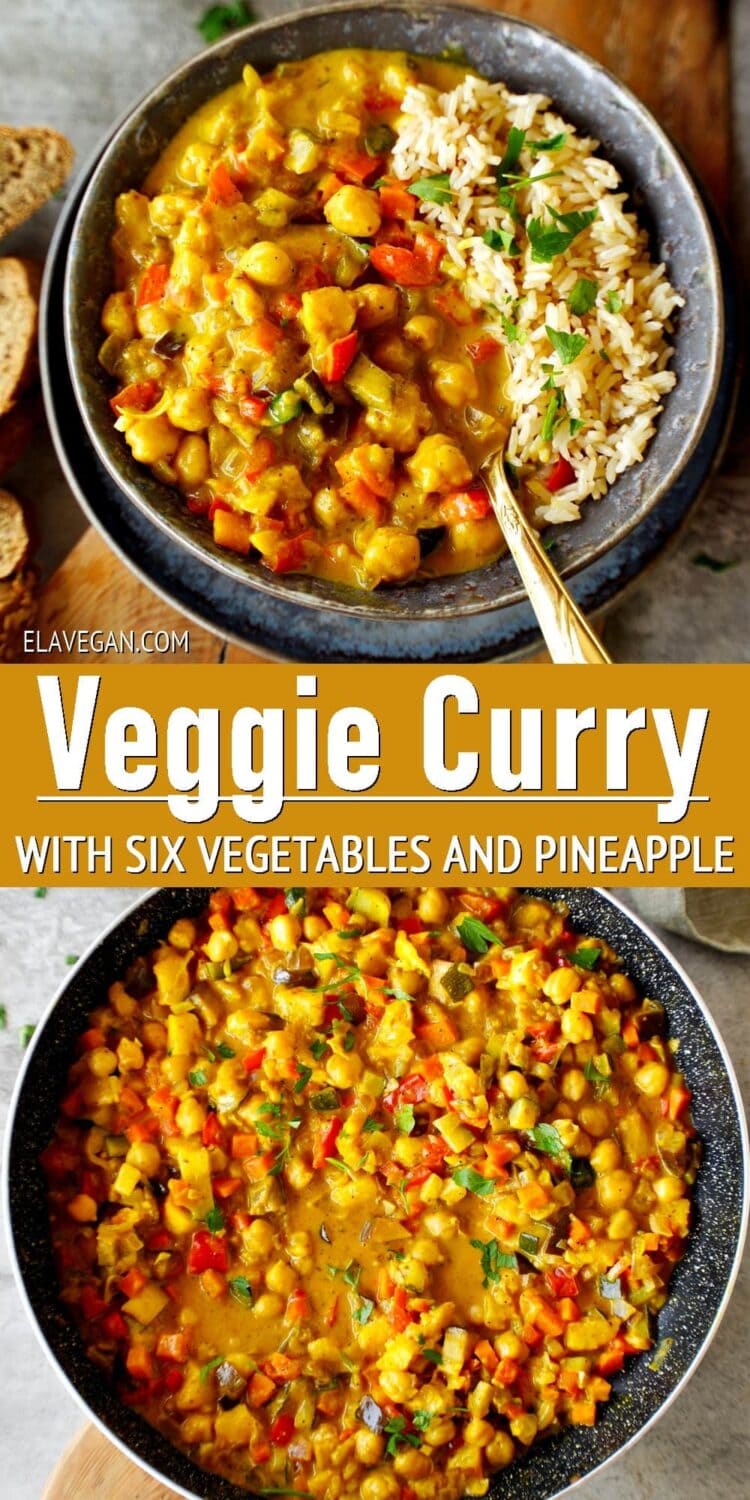Simple Sweet and Savory Pineapple Curry with 6 Vegetables
Curries are one of my favorite super satisfying meals to enjoy no matter the time of the year, but this Indian coconut curry is one of my favorites for the warmer summer months. By adding pineapple to this vegetable curry recipe, the tangy sweetness provides a super satisfying contrast to the creamy coconut milk and spicy, warm curry sauce. As a result, it tastes truly comforting while remaining healthy, well-balanced, and refreshing. Better yet, this veggie curry with coconut milk is a simple, one-pan, 40-minute meal packed with flavor and texture. It’s easily adjustable, too – use any veggies you like, adjust the heat level, swap Indian curry powder for Thai curry paste… etc. Plus, you can use fresh, canned, or frozen pineapple to enjoy it year-round. It tastes even better the longer it sits, too, so make plenty of leftovers! For more vegan curry inspiration, you may also like my creamy chickpea eggplant curry, Thai curry noodle soup, or sweet potato spinach curry!
The Ingredients
Pineapple: Use fresh or canned pineapple (drained) in small chunks. Chickpeas: (or other beans) add plant-based protein and make a heartier vegetarian curry. Vegetables: I used a delicious combination of carrot, eggplant, zucchini, and bell pepper. Read below for more options. Aromatics: This fragrant veggie curry recipe relies on both freh onion and garlic. Seasonings: To make the flavor-packed pineapple curry sauce, I use a combination of simple pantry-friendly spices: Curry powder (mild, medium, hot, or extra-hot) Onion powder Smoked paprika Turmeric (optional – adds a deeper yellow color) Cayenne pepper/ chili powder or red pepper flakes (optional – for additional heat) Salt & black pepper (to season to taste) Coconut milk: Use full-fat canned coconut milk for the creamiest Indian curry, though light coconut milk works too. If you want a lighter curry, use other plant-based milk (like cashew milk, soy milk, etc.) though it won’t be as creamy. Cornstarch: (optional) This (or potato starch) will thicken the vegan curry. Oil: Use any neutral cooking oil. For an oil-free version, use water/ veg broth. To serve: I usually serve this vegetable curry garnished with some fresh cilantro or parsley, rice (I prefer brown rice or basmati or jasmine rice), and sometimes lemon/lime wedges.
To Add to Or Adjust This Vegetable Curry Recipe
More or other vegetables: Almost anything goes here. I.e., green beans, snow peas, cauliflower, broccoli, mushrooms, bamboo shoots, spinach/kale, potato, tomato, sweet potato, and/or butternut squash. Other protein: Instead of or alongside chickpeas. Like tempeh, tofu, or TVP. Ginger: To add more heat and flavor, use fresh or dried ginger powder. Coconut: Add 1/4-1/3 cup grated coconut (dry toasted) into or as a garnish. Thai twist: Swap the Indian curry powder for a vegan (like Thai Kitchen brand) yellow, green, or red curry paste (adjust the amount to taste). Nuts/seeds: Lightly toasted cashews or pumpkin seeds will add extra texture along with healthy fats and protein.
Please read the recipe card below for the full ingredients list, measurements, complete recipe method, and nutritional information.
How to Make Vegetable Curry
Stovetop Method
First, dice all the vegetables (onion, eggplant, carrot, zucchini, and bell pepper), including the pineapple. Also, peel and mince the garlic.
Next, heat a little oil (or a splash of water/ veggie broth) in a large pan over medium heat. Once hot, add all the prepared vegetables. Sauté for 8-9 minutes, stirring often. Stir in the garlic and sauté for a further minute. Then, drain and rinse the chickpeas and add them to the pan along with the pineapple chunks. Also, add the coconut milk and all the spices and stir well to combine. Allow it to simmer for about 10 minutes (or longer for a thicker curry).
If it’s not thick enough, add 1-2 tsp of cornstarch mixed into a slurry (with coconut milk). Increase the heat and stir until thickened.
Taste and adjust any of the seasonings to taste, then serve the veggie curry, optionally garnished with cilantro (coriander).
Slow Cooker Method
Add all the ingredients to your slow cooker and cook on HIGH for about 4 hours or LOW for 7-8 hours.
Though it isn’t mandatory, you can optionally complete the sauté steps in a skillet first, to add more depth to the pineapple curry.
Taste and adjust the seasonings, then serve while warm.
Serving Suggestions
Enjoy this vegetable coconut curry the same as other delicious curries with sides like:
Naan bread (or paratha/chapati/ roti) or your favorite bread Cooked rice (like brown rice, jasmine, or basmati rice) or quinoa Low-carb cauliflower rice Potatoes A dollop of vegan yogurt (to help tame the heat) Vegetable pakora Onion bhaji
Feeding two? Try serving this vegetable pineapple curry in empty pineapple halves for a beautiful presentation (see photo further below).
Storage Instructions
Store: This veggie coconut curry tastes even better on day two, so I’m a big fan of making enough for plenty of leftovers. Allow it to cool, then store leftovers in an airtight container in the refrigerator for 3-4 days. Freeze: While freezing softens the vegetables/ pineapple (which some may not enjoy), this vegetable curry can be stored in freezer bags for 2-3 months. Allow it to thaw in the refrigerator overnight before reheating. Reheat: Reheat the curry gently on the stovetop or in the microwave until piping hot. Add a splash of coconut milk or broth if the sauce has thickened too much (as the veggie will absorb some of the sauce).
Can I substitute the pineapple?
I’ve had a reader use mango instead and love the results.
Can I use Thai curry paste instead of Indian curry powder?
Yes, that should work fine, though I think you’d need more paste than powder (about 2 tbsp). However, add it to taste. Obviously, the overall flavor profile of the dish will change too, but both pair wonderfully with coconut milk and pineapple. If you use Thai curry paste, omit the smoked paprika and turmeric, and add the remaining spices to taste.
Is this pineapple vegetable curry healthy?
Curry powder generally contains several health benefits, including protection against chronic diseases such as heart disease, cancer, and Alzheimer’s. It is also anti-inflammatory, beneficial to immune health and bone health, and can improve liver function. When combined with a variety of six different vegetables (and pineapple), this vegetarian curry contains a plethora of antioxidants, vitamins, minerals, and beneficial plant compounds.
Recipe Notes and Tips
Select a good pineapple: The pineapple should be firm to the touch with a green (not yellowing) leafy crown and a subtle sweet smell near the base (overly sweet/acidic can mean it’s overripe). Adjust the thickness: Use more liquid for a more soupy consistency, and add cornstarch slurry to thicken it.
More Vegan Curry Recipes
Indian Pumpkin Curry Easy Potato Curry Recipe (Vegan) 1-Pot Green Lentil Dal Recipe Kitchari Ayurvedic Moong Dal Recipe Red Lentil Dahl (Best Recipe)
If you try this Indian vegetable curry recipe, I’d love a comment and ★★★★★ recipe rating below. Also, please don’t forget to tag me in re-creations on Instagram or Facebook with @elavegan and #elavegan – I love seeing them.
If you are using Pinterest, feel free to pin the following photo:
